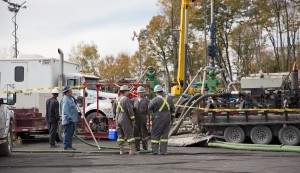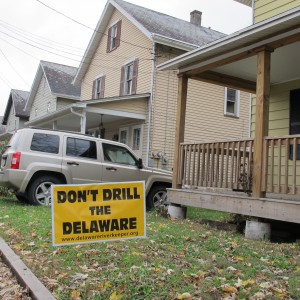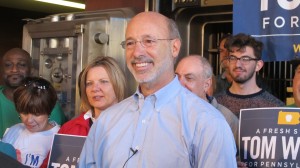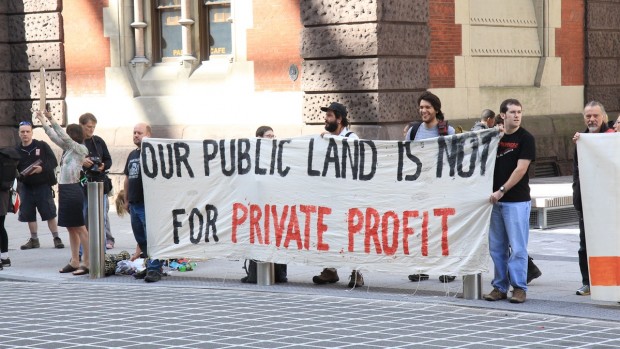What Wolf’s win means for energy and the environment
-
Susan Phillips
Now we know. Democrat Tom Wolf will indeed be taking the reins from Gov. Corbett in just over two months.
For the first time since 1954, an incumbent Pennsylvania governor did not either win re-election or cede power to someone from their own party.
That’s an historic loss for Pennsylvania’s GOP, which has been supportive of the gas industry, so reaction to Wolf over Corbett broke down along predictable lines.
Lou D’Amico of the Pennsylvania Independent Oil and Gas Association says Wolf’s policies could lead to job loss.
Cindy Dunn, director of PennFuture said, “For the environmental voters, it was a referendum of Gov. Corbett’s handling of the gas industry.”
Let’s take a look at what Wolf’s win might mean for energy and environment.
Marcellus Shale tax battle lines
Wolf’s plan to replace the current impact fee with a 5 percent tax on the market value of natural gas may run up against more opposition than he seems to expect.
He says at current production levels this tax could bring in $1 billion, which is about $800,000 more each year than the current impact fee. He says he’ll use that money to help boost funding for the state’s failing public school systems.
But he’s got to contend with a Republican legislature. And ideas that poll well with voters during a campaign pre-election does not always translate well to momentum in Harrisburg post-election. Still, drillers are worried, and not so sure they’ve got the support in Harrisburg they need to head off a tax hike.
D’Amico, president of the Pennsylvania Independent Oil and Gas Association, says some drillers are talking about leaving the state if Wolf succeeds in imposing a new severance tax. And although he says the industry does enjoy bipartisan support in Harrisburg, D’Amico worries about lawmakers from non-drilling areas like Philadelphia.
“If you’re not seeing your hotels full, if you’re not seeing the local Ford dealer selling trucks to drillers, then you’re not concerned as much in Philadelphia [with the potential slow-down of gas drilling] as you are in Bradford, Tioga, or Susquehanna counties where they are benefiting from us being here.”
D’Amico says the legislative battle over a Marcellus Shale tax may not be restricted to party lines.
“Part of it is going to be partisan,” said D’Amico. “And you’re going see regionalism involved. Both will pop up.”
And here’s where the industry and some anti-drilling “fractivists” may have similar goals, albeit different reasons for getting there. Maya van Rossum, from the Delaware Riverkeeper Network, says she’s “cautiously optimistic” about Wolf’s win. But she too worries about a new severance tax.

Lindsay Lazarski / WHYY
Workers vacuum water or fluids surrounding a frack site in Harford Township, Susquehanna County, Pa.
“Wolf has gone on the record saying he does believe in maintaining the moratorium on drilling in the Delaware River watershed and that’s good news for the river,” said van Rossum. “On the other hand, he’s expressed his support for shale gas production by using it as a fundraiser for other budget-line items. And by using that money for education, health, the elderly, you create new constituencies calling for more shale gas development. But for all those constituencies shale gas development is a negative.”
But try telling that to education advocates desperate to keep the schools afloat. One group that’s sure to benefit from the shale tax debate in Harrisburg is lobbyists. And you may see industry battling against teacher’s unions. For some companies, the changing of the guard is just part of doing business.
“As a traditional, historic Pennsylvania gas company with 101 years in the commonwealth, this wouldn’t be the first time we’ve worked with a change in administration,” said Rob Boulware, spokesman for Seneca Resources. “Obviously whatever takes place, it’s a legislative process. We certainly will work with the legislative process just like we have with other regulations.”
No drilling in state parks and forests?
Wolf promised not to allow anymore drilling in the state parks and forests. That would put the kibosh on Corbett’s plan to raise more revenue to help plug a budget gap by lifting a Rendell era moratorium on leasing new state land.
That’s bad news for any drillers who may have been negotiating with the administration for those resources. It’s good news for park lovers fighting to keep the drillers out.
Cindy Dunn of the environmental group PennFuture says her group plans to hold Wolf to his promise.
“When Wolf is sworn in as governor, he will swear to uphold the state constitution, which includes the environmental rights amendment,” said Dunn. “And this is something that I think he will pay attention to.”
Dunn’s group supports the 5 percent severance tax, because she says it will raise more money and benefit all Pennsylvanians.
But some environmental activists want Wolf to go further.
“He should be looking to put in place a moratorium in the state,” said the Riverkeeper’s van Rossum.
Iris Bloom, from the anti-fracking group Protecting Our Waters, says her group is still focused on banning drilling.
“We’re going to be pushing harder than ever for a moratorium,” said Bloom. “We’re already seeing more collaboration, more direct action, more people running on a local level who support a moratorium.”
Despite Wolf’s support for a Delaware River basin drilling moratorium, plus the ban on new leases for state lands, he will certainly have to contend with drilling opponents who are stepping up the pressure with direct action. Several activists were arrested this week at both the recently approved Cove Point natural gas export terminal in Maryland and the Federal Energy Regulatory Commission in Washington D.C.
When it comes to pipeline infrastructure projects, a growing battleground in the fight over natural gas drilling, Wolf may find himself straddling a fence between industry and activists.
Dramatic shift at the DRBC
As Wolf pledges his support for a continued moratorium on drilling in the Delaware River Basin, which includes Pike and Wayne counties, he will get some say over policy at the Delaware River Basin Commisson.

Susan Phillips / StateImpact Pennsylvania
A drilling protest sign sits on the lawn of a home along the Delaware River.
The five members of the DRBC – Pennsylvania, New York, New Jersey, Delaware and the feds – have been at a stalemate over drilling. The Corbett administration, joined by New Jersey Gov. Chris Christie, pushed hard to get the moratorium lifted. But Delaware and New York have wanted it to continue. The fifth member, representing President Obama, has been silent. With Wolf replacing Corbett, that’s a major power shift. And that lifts the spirits of activists like the van Rossum.
“Our precarious position with the commission shifts dramatically,” said van Rossum. “And we’re removing the incredible political pressure Pennsylvania was trying to assert on other commissioners. And then we will have a commissioner more open to science and fact.”
Environmentalists like van Rossum have been urging the DRBC to take a more active role in the planning and siting of natural gas infrastructure projects like pipelines.
“And so we may also have a more interested ear in taking a firmer stance on the importance of the DRBC intervention [in these projects],” she said.
Overall the industry seems wary of Wolf, while the environmentalists are glad to see Corbett go.
“Wolf does seem to be someone who is more thoughtful and open to facts and science and realities and he’s not so much in the pockets of the drillers and frackers,” said van Rossum.
Environmental protection and climate change
PennFuture’s Cindy Dunn says one thing Tom Wolf will need to do in his first 100 days is start reforming the Departments of Environmental Protection and Conservation and Natural Resources.
“The perception is that [Corbett] was very lax with the regulations, relied on self-policing, and did not promote renewables,” Dunn said.
Dunn, who worked as a deputy secretary at DCNR before taking the job at PennFuture, says restoring faith in those agencies takes good leadership. And Wolf may have to work hard to build back public trust:
“It’s interesting for me because i’ve worked in a number of administrations and it is amazing how important direction from the top is when it comes to choosing agency leaders, and communicating high expectations of serving the public.”
Dunn says she’s happy that the incoming governor is committed to battling climate change. Corbett had opposed the EPA’s new carbon rules, which aim to reduce carbon dioxide emissions from power plants. Dunn says in addition to CO2, Wolf needs to tackle greenhouse gas causing methane leaks from older pipelines and gas infrastructure.
“Top of the list is methane leaks,” said Dunn. “We’re also saying [Wolf] needs to affirm that local zoning trumps industry wishes when it comes to gas drilling.”
Dunn refers to last year’s Supreme Court ruling on the zoning issue, which overturned key aspects of the state’s new drilling law against the wishes of both the Corbett Administration and the gas industry.
While Dunn celebrated the end of Corbett’s reign, Seneca Resources spokesman Rob Boulware took advantage of the election day slow down at the Capitol to go for a bike ride.
“Right now we’re just looking to see how things move forward,” said Boulware.


















